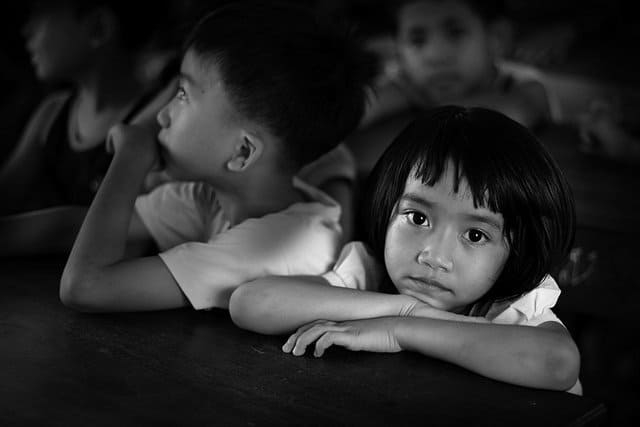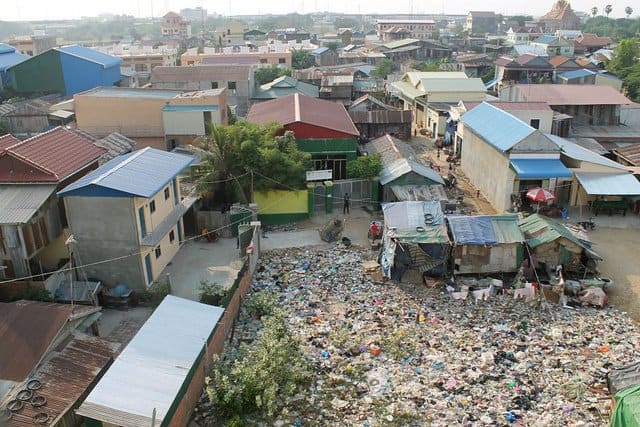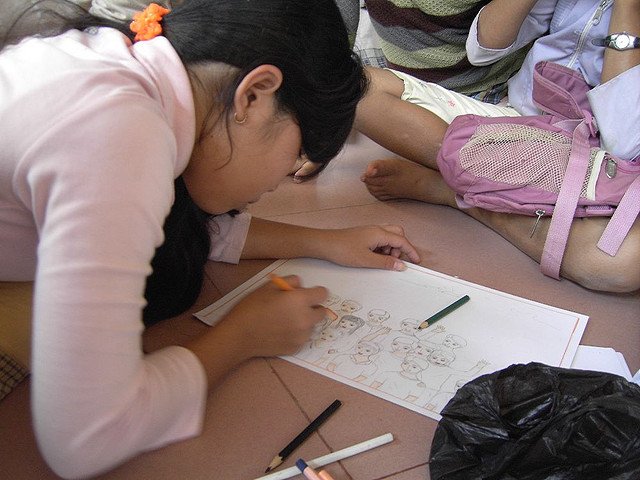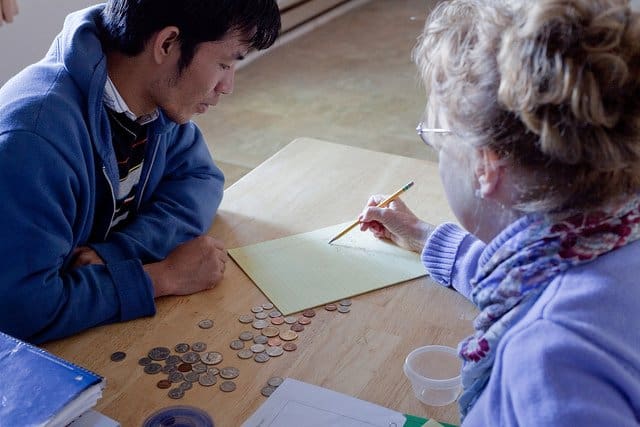A common plan among travellers doing a gap year, going abroad during retirement or engaging in long-term travel is to do some volunteering in a foreign country. Thousands of volunteer placements are made in dozens of countries every year, making “voluntourism” a fast growing sector in the travel industry. Armed with lofty notions about doing good and giving back to the world, the buzzwords of sustainability and community embedded in their thoughts, many volunteers head out into the world without a second thought about their actions and intentions.
If I sound harsh I do so because this is a very serious issue. Of course doing good is a good thing. Of course giving back will make a difference in this harsh world that sometimes seems to be crumbling around us. But did you know that going to volunteer in a poor country can often do more harm than good? Many people are now challenging common assumptions about “charitable” work overseas, including authorities like UNICEF and professionals who work closely with the beneficiaries of volunteer efforts. And they do so for very good reasons.

Photo by Neon Tommy from Flickr (illustrative purposes only – we do not know the situation of any of the people depicted in this post)
“It is really important for potential volunteers to research this subject to ensure they do no harm,” says Alan Kiff, campaign manager for International Child Campaign, a United Kingdom (UK) registered non-governmental organisation. “They should also be very aware that there are many people waiting to cash in on the good intentions of potential volunteers…who use children to get money from western donors…Compared to many other business opportunities, orphanages are easy money. Set up an orphanage, ask for donations, ask for volunteers (and their fees) and you can live a rich life in Cambodia. It is no accident that most orphanages in Cambodia are set up near the tourist trails and resorts.”
The International Child Campaign, which works for children’s rights, education and welfare worldwide is one of many organizations currently raising global awareness of this issue. Their efforts are sometimes difficult.
“In countries like Cambodia and Nepal, many organisations providing service in-country cannot speak out freely about the situation they face,” says Kiff. “Otherwise they could be closed down or otherwise harassed, to the detriment of the children they help. Many of the people who run these orphanages are criminals and can be a real danger to anyone who speaks out against them. They often have connections in the police force or in local government that protect them.”
It is important to understand the hard facts about what happens when western volunteers come into a poor country. In many instances, the demands of the wealthy visitors, often packaging a volunteer experience with a holiday, overrun the needs of the impoverished community. Local workers are replaced by volunteers, especially when they pay to volunteer, which is detrimental to the community and its people. The institutions have to use much-needed resources to upgrade their facilities to suit the expectations of rich foreigners. In the case of orphanages, vulnerable children are further traumatized by the short-term bonds they form with visitors who inevitably abandon them to return home. In the very worst cases child exploitation and abuse are rife.
Think about it this way. People in rich countries like the United States complain when cheap labour takes their jobs away. The same thing can happen in poorer communities when white foreigners offer to come in and work. Most of the time the volunteers are young and coming from the UK, United States (US), Europe, Canada, Australia and New Zealand. They are often given jobs that they have no specialized training for, building houses when they have never picked up a hammer in their lives, for example. When working with people, especially children, the issue is significantly more serious.
The Problems With Orphanages
“Only trained social workers and childcare professionals should work with these children,” says Kiff. “They are vulnerable, often traumatised and very fragile. When trained social workers and childcare specialists do visit these orphanages, they see through all the pretence. It is only untrained, well-meaning, relatively rich people that the orphanages want to attract,” says Kiff.
It becomes a bit arrogant when you think about it. What would the reaction be if untrained foreigners came into a children’s facility in the US or the UK to be responsible for the children there?
“Consider a volunteer organisation or business who are in no way specialized in child protection, social work or knowledgeable in child care selecting a Cambodian gap year student to volunteer with these children in your country,” says a representative from Orphanages.No, who prefers not to be named for safety reasons. “It wouldn’t happen because in the west we have strict regulations for who is allowed to interact with vulnerable children and rightly so since vulnerable children also attract people that want to take advantage of them. So why is it ok for western volunteer agencies and businesses who are in no way specialized to do that in Cambodia? Are children here not worthy of the same protection as we provide our own children back home?”
Inevitably the biggest benefits are for the volunteer. The issue of orphanages is even more important because in many cases these children are not even orphans in the first place.
“We ask people to stop and think about orphanages for a moment – where are all the orphanages run by the big international child welfare organisations like UNICEF, Save the Children and Plan International? They don’t run any. Not one. None,” says Kiff. “All these top professional child welfare care agencies are against using orphanages as a system of childcare. They know that children should grow up in a family environment, in a community. Not locked away in an orphanage. All orphanages in western Europe, Australia and New Zealand were closed down in the 1970s. With a few notable exceptions, governments do not run orphanages.”
“Most children in orphanages, in Cambodia and in other countries, do have a family that they could live with. Most do have a mother or a father. There are organisations that work specifically to reunite children with their families, to support those families if they are in need and to find suitable alternative families where the biological family really is not a good option. The use of the word orphanage is used specifically to open the pockets of donors. The two things all children in orphanages do have in common are poverty and a desire to live in a loving family. Every dollar given to an orphanage, through direct donations or through volunteering fees, keeps those children away from a loving family.”
Kiff also notes that while this problem exists in many places in the developing world, it is particularly bad in certain countries, such as Cambodia and Nepal. From 2005 to 2010, there was a 75% increase in tourism in Cambodia. During those years there was a 76% increase in orphanages.
“This fact alone should ring alarm bells in everyone thinking of volunteering at an orphanage,” says Kiff. “Tourism does not create poverty, but it can create orphanages.”
But be aware that this problem is also present in many other Asian and African countries. According to Orphanages.no, this will most likely become an issue in any developing country once it becomes a popular travel spot. Indonesia and Sri Lanka, for example, also have very high percentages of non-orphan children living in orphanages.
“In terms of the damage provided by orphanages or institutions you don’t have to look that far back into our own history, where the abuse of children living in institutions in Europe is well documented and so is the psychological and physiological effects of institutionalization of children,” said the representative. “We in the west have a demand, to visit ‘orphans’, here they provide a supply and we can go away feeling good about ourselves thinking we did something good for half a day. When in fact we contributed to both damaging the child mentally and our drive to experience this ensures that yet more children are separated from their families.”
With the exception of two, all of the world’s governments have signed up to the United Nations Convention on the Rights of the Child, which is elaborated in the Guidelines for the Alternative Care of Children. These documents stress the need for children to grow up in a family and that residential care should only be used as a last resort – and for the shortest possible time.
“So, in theory,” says Kiff, “the government in Cambodia has an obligation to step in and protect these children. Working against this obligation are many vested interests. Some are very powerful. The criminals who run orphanages for profit buy influence in the law enforcement agencies. Also, many orphanages are run by foreigners and the government washes it hands of these as it does not want to fight against these well-meaning people, many who are backed by powerful faith-based organisations.”
On a positive note, many governments are working to combat these problems and abuses. But it is taking time for them to catch up.
“It’s a relatively new problem,” says Tessa Boudrie, a child protection specialist with a degree in social work, currently living and working in Cambodia. “It’s very popular at the moment to volunteer, much more than 15 years ago, and governments need time to adapt.”
“It’s not always money driven,” she says. “There are people who really believe that children are better off in their specific orphanage. And of course if you look at it from a very simple perspective you say that children living in a poor family who do not go to school, do not get enough food, do not have clothes, are better off in this orphanage. But if you were to look at what effect that has on families and on those children and how you could have actually used that money that was spent in a better way, and working with families and communities to ensure that these people can actually stay together.”
Charity Should Begin At Home
Volunteers have to be vigilant and exercise due diligence when choosing what they do when travelling or living in foreign countries. According to Boudrie, the problem of doing more harm than good exists across all charities, not just orphanages.
“Why would you want to go and volunteer to build a house when local carpenters would do a much better job,” asks Boudrie. “It destroys the local economy.”
“The easiest thing would be to just enjoy your travels and do volunteering back home in your own country where you can be sure that you can have a positive impact,” says the Orphanages.No representative. “If you necessarily feel that you have to volunteer during your travels than aim for things that don’t involve children to start with, but always be critical.”
“Broadly speaking, volunteering abroad is a good thing,” says Kiff. “It particularly helps the volunteer to see past the tourist trappings and get to know real people. This helps break down national stereotypes. Like with many ventures, volunteering can do harm or it can do good for the people in-country.”
But If You Still Feel That You Must Volunteer Overseas…
Boudrie, who also runs her own consultancy, Boudrie Advisory, advising wealthy people on philanthropy, has some tips. She says that the first step is to assess for yourself why you want to go and volunteer in the first place.
“What is your motivation? Are you doing it because it makes you feel good? Because you think that it looks good on your resume? If you really want to contribute something the biggest question you have to ask yourself is what am I good at and what can I contribute instead of asking what is the need can I do something there,” she says.
“I see lots of people doing work that they’ve never done before in their lives but suddenly because they think that because they are in a poor country they think they can take on those jobs. Volunteering itself is not necessarily a bad thing. If you have a specific skill that you can transfer to a group of vulnerable people then that could be a great contribution. It’s about what you are good at and what is actually transferable.”
Once you have that clear you can then start to ask yourself how you can be the most effective. The mission will then become about what skills you have and what you can transfer. After all, teaching people how to do something for themselves will help them more than just doing things for them.
“Once you’ve done that then you’ve actually narrowed down quite a bit to be able to specifically search for certain organizations or charity opportunities,” says Boudrie.
She warns, however that it is not easy for the average person to do their own due diligence. Determining where to give money is what she does for a living and she claims that it is “a very difficult job.”
“I do lots of due diligence, looking at individual opportunities from so many different angles,” she says. “It is tough, even for a professional. Don’t be naive. Get specialized help with that.”
She finds that many websites and companies who have listings for volunteer placements have a financial benefit to them.
“So then you have to wonder how well the due diligence is done.”
According to Kiff, “There is so much good that can be done. And so much harm. The most charitable thing people can do during their travels is first learn about the issues facing other communities and treat them with dignity and respect.”
“Helping communities to overcome the issues they face is not easy. Otherwise it would have been done long ago. We recommend that people who want to volunteer start at home, checking with their own county’s volunteer service organization or equivalent (Peace Corps, United Nations Volunteers, Australian Volunteers International). The next step is to contact the many highly respected development agencies, such as UNICEF and Save the Children. The answers from the VSOs and UNICEFs are unlikely to be as easy as ‘great, pay your volunteer fee and off you go.’ Development is not easy. We caution against the many commercial companies (many posing as non-profits) who advertise for volunteers and charge volunteer fees.”
“Lots of people don’t realize that they are actually doing it for themselves,” says Boudrie. “And I’m not saying that’s a bad thing – doing something for yourself is great, and if you acknowledge it then you’re already [getting there]. People literally think they are going to make a difference for someone else or a particular cause but that’s not always the case.”
If you’ve already done a volunteer placement, don’t despair. Following these tips, however, in the future is important. And if you noticed unacceptable conditions or practices at the place where you volunteered, blow the whistle on it. You can contact any of the organizations mentioned in this post and find out where the most appropriate place to report the misdeeds are. Awareness is crucial in order for these practices to change for the better.
Further resources and opportunities to make a difference:
The REPLACE Campaign – replace the need for orphanages




